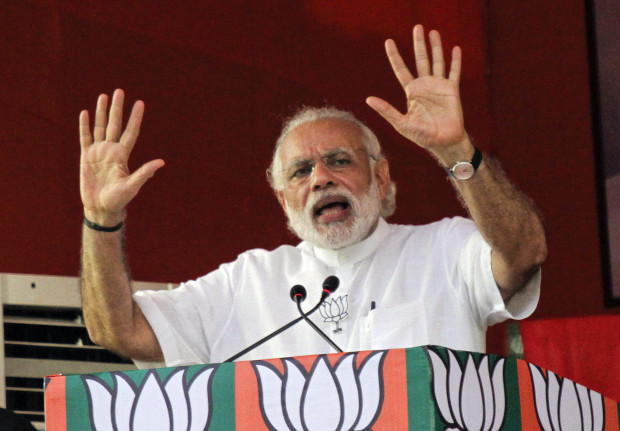Indian PM, once a pariah to US, set to address Congress

In this April 17 photo, Indian Prime Minister Narendra Modi speaks at an election rally of the ruling Bharatiya Janata Party in Kolkata, India. AP
WASHINGTON—After years of being denied entry to the US, Indian Prime Minister Narendra Modi has become a welcome guest in Washington, forging a surprising bond with President Barack Obama and deepening ties with America.
A new defense agreement and a possible announcement on US investment in nuclear power in India could be in the cards on his latest visit. He will meet with Obama on Tuesday and have the honor of addressing a joint meeting of Congress on Wednesday.
Modi has shaken off allegations that he was complicit in anti-Muslim violence when he served as a top state official before becoming prime minister two years ago, but he could face pointed questions from lawmakers about India’s human rights record.
It will be his fourth visit to the US since his Hindu nationalist party swept elections in May 2014. Between 2005 and late 2013, during his tenure as chief minister of Gujarat, the US government avoided official contact with Modi over suspicions about his possible role in communal rioting that killed hundreds.
“He’s gone from someone who was basically a pariah to someone who is going to be celebrated by official Washington,” said Milan Vaishnav, an expert on South Asia at the Carnegie Endowment for International Peace.
Modi will become the fifth Indian prime minister to address both houses of Congress. He’ll also have lunch with congressional leaders and attend a reception hosted by the House and Senate foreign relations committees, where there’s strong support for closer ties, but also some disappointment over what’s been achieved on Modi’s watch.
On the plus side of the ledger, defense ties have gotten closer. The US and India share concern about the rise of China, and while New Delhi steers clear of a formal alliance with Washington—in fact, with any country—the two militaries conduct more drills together than with any other nation.
The US has become a key supplier of defense equipment to India—with about $14 billion in sales contracted in the past five years—and the two nations are looking at joint development of technologies for jet engines and aircraft carriers. A defense logistics agreement is likely to be finalized when Modi visits.
Progress has been more elusive on opening the way for the US nuclear industry to invest in India, eight years after the George W. Bush administration reached a landmark civil nuclear agreement with India, rolling back export restrictions in place since India’s first nuclear test explosion in 1974.
The prime obstacle has been a 2010 Indian law on liability in case of accidents at nuclear power plants, but a workaround solution involving an Indian-supported insurance scheme means Westinghouse Electric Co. is closing in on a contract to build reactors in Andhra Pradesh state — a deal potentially worth tens of billions of dollars.
Arun Singh, India’s ambassador in Washington, told reporters Wednesday that negotiations between Westinghouse and the Indian nuclear operator were at a “very detailed and advanced” stage. He said the main issues to be resolved concern cost and financing, not insurance. He did not say if a contract announcement was imminent.
Westinghouse declined to comment Friday. Another US player, GE Hitachi Nuclear Energy, said it is still concerned about the Indian law, which could make nuclear suppliers, not just operators of nuclear plants, liable for accidents.
While US lawmakers praise the progress in defense ties, they grumble about continuing restrictions on American investment in India, notwithstanding some liberalization on Modi’s watch. Bilateral trade in goods and services has expanded from $60 billion in 2009 to $107 billion in 2015.
“In the case of US-India relations, the hopeful rhetoric has far exceeded actual tangible achievements,” Republican Sen. Bob Corker, chair of the Senate Foreign Relations Committee, told a hearing last month.
Lawmakers of both parties also criticized India’s failure to curb growing religious intolerance and human trafficking, and are likely to raise those issues with Modi. An Australia-based activist group estimates that India has around 18 million modern slaves, or 40 percent of the global total.
The world’s two largest democracies have a surprisingly acrimonious relationship when it comes to human rights, and what India views as overbearing US scrutiny. India has refused visits by a US commission on religious freedom and by an envoy on LGBT rights.
It also objects to a House commission holding a hearing on human rights in India on the same day Modi meets Obama.
“Normally in India we would not want to embarrass somebody when they are our guest. But I guess each society is different,” Singh, the ambassador, said.














